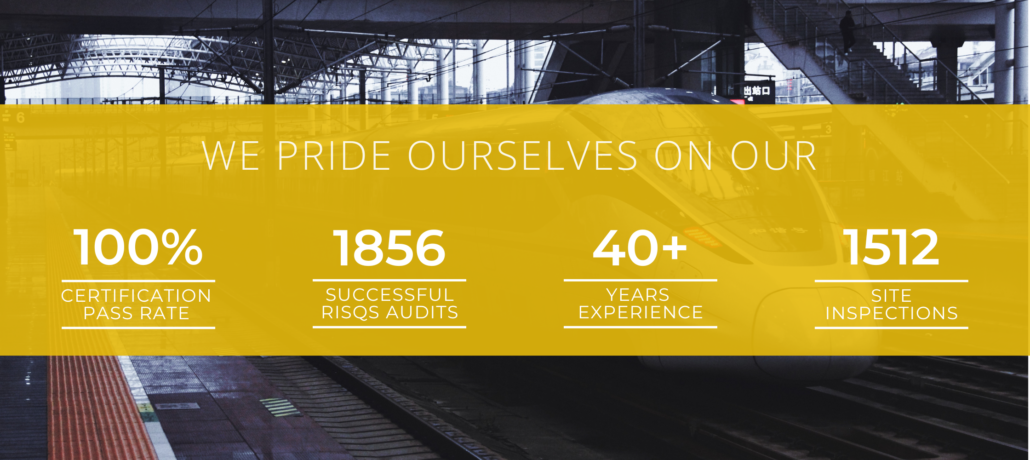What is the RISQS RICCL List?
What is the RISQS RICCL List?
Introduction
The Railway Industry Supplier Qualification Scheme (RISQS) serves as a beacon of standardisation and safety within the railway industry. At the heart of this essential framework lies the RISQS RICCL List (Railway Industry Commodity Classification List), a pivotal element that bridges suppliers with the intricate demands of the railway sector. This comprehensive guide delves into the nuances of the RICCL list, underscoring its significance, functionality, and overarching impact on the railway industry’s supply chain dynamics.
Understanding the RISQS RICCL List
The RICCL List stands as a testament to the railway industry’s commitment to safety, quality, and efficiency. Structured as a comprehensive classification system, it encompasses a wide array of commodities, including equipment, materials, and services, pivotal to railway operations. This classification system facilitates a seamless interaction between suppliers and buyers, ensuring that only qualified suppliers partake in the railway’s procurement processes.
The Purpose Behind the RICCL List
Central to RISQS’s ethos, the RICCL list serves multiple key purposes:
- Standardisation: It creates a unified language for suppliers and buyers, enabling clear communication and understanding of supply requirements.
- Safety and Compliance: By categorising commodities based on predetermined criteria, it ensures suppliers meet the stringent safety and quality standards required in the railway industry.
- Efficiency: Streamlines the procurement process by providing a clear framework for identifying and selecting qualified suppliers.
Navigating the RICCL List: A Closer Look
Suppliers engage with the RICCL list by selecting codes that align with their product and service offerings. These codes not only represent their capabilities but also dictate the assessment processes they undergo as part of the RISQS certification. The classification into ‘auditable’ and ‘verification’ codes plays a crucial role, in determining the rigor and nature of the qualification process.
The Selection Process
Choosing the appropriate RICCL codes is a strategic decision that suppliers must navigate wisely. This selection impacts their RISQS audit outcomes and their ability to supply to the railway industry. It’s important to emphasise the importance of thorough research and alignment with industry standards when making these selections.
The Impact of RICCL on Suppliers and the Railway Industry
The RICCL list’s influence extends beyond mere classification. It embodies a quality and safety assurance mechanism that benefits both suppliers and the railway sector at large.
For Suppliers:
- Visibility and Credibility: Aligning with the RICCL list enhances a supplier’s visibility to potential buyers and establishes their credibility in meeting industry standards.
- Market Access: It opens the door to a vast network of procurement opportunities within the railway industry, reserved for compliant and qualified suppliers.
For the Railway Industry:
- Quality Assurance: Ensures that all suppliers and their offerings meet the high safety and quality benchmarks essential for railway operations.
- Procurement Efficiency: Simplifies the buyer’s task of identifying and engaging with qualified suppliers, thus optimising procurement processes and timelines.
The Evolution of the RICCL List
The railway industry is characterised by rapid technological advancements and evolving safety standards. The RICCL list is not static; it undergoes regular updates to reflect these changes and ensure continued relevance and compliance. Suppliers must stay abreast of these updates, adjusting their RICCL code selections as necessary to maintain alignment with industry requirements.
FAQs: Unpacking Common RICCL List Queries
Simpson Consultancy addresses some of the most frequent questions regarding the RISQS RICCL List:
How do I determine which RICCL codes to select for my business?
-
-
- Determining the right RICCL codes for your business involves matching your products or services with the appropriate classifications in the RISQS system. Start by exploring the interactive RICCL list on the RISQS portal, inputting the specifics of what your company offers. This step ensures your business aligns with the precise codes that reflect your current offerings, facilitating accurate representation in the railway industry’s supplier database.
-
What are the implications of choosing auditable versus verification codes?
-
-
- Choosing between auditable and verification RICCL codes affects the level and type of assessment your business will undergo for RISQS certification. Auditable codes require a formal audit process to demonstrate compliance with industry standards, suitable for higher-risk offerings. In contrast, verification codes are assigned to less critical services or products, requiring a simpler verification process to complete your registration. This choice significantly influences the preparation and documentation efforts your business must undertake.
-
Can I update my RICCL code selections if my business offerings change?
-
- Yes, you’re encouraged to update your RICCL code selections to keep pace with any changes in your business offerings. This flexibility allows your business to remain compliant with the latest industry standards and ensures your company’s profile accurately reflects its current capabilities within the RISQS platform. Regular updates are crucial for maintaining relevance and compliance in the dynamic railway industry landscape.
These and other queries are crucial for suppliers navigating the RISQS certification landscape, underscoring the need for a strategic approach to RICCL list engagement.For additional FAQ’s regarding the RICCL list, you may refer to the RISQS supplier’s FAQ page.
Leveraging Simpson Consultancy’s Expertise
Navigating the RISQS RICCL List can be a daunting endeavour, particularly for new comers to the railway industry. Simpson Consultancy specialises in simplifying this process, offering tailored advice and support to suppliers seeking to align their offerings with the RICCL list and achieve RISQS certification.
Conclusion
The RISQS RICCL List is more than a classification system; it is a cornerstone of the railway industry’s procurement and supplier qualification framework. Its role in ensuring safety, quality, and efficiency cannot be overstated. As the industry continues to evolve, the RICCL list will adapt, maintaining its pivotal position in shaping the industry’s future. By fostering a deeper understanding of its mechanisms and adhering to its guidelines, suppliers can significantly enhance their contributions to the railway sector’s success.
Call to Action
Embarking on the journey to RISQS certification can be a complex process, laden with specific requirements and strategic decisions. At Simpson Consultancy, we specialise in navigating these waters, offering comprehensive support to suppliers at every step of their certification journey. Contact us today for a free, no-obligation quote on RISQS certification services. Let our expertise guide you through the intricacies of the RICCL list, ensuring your offerings meet the high standards of the railway industry. Together, we can pave the way for a safer, more efficient railway future.







